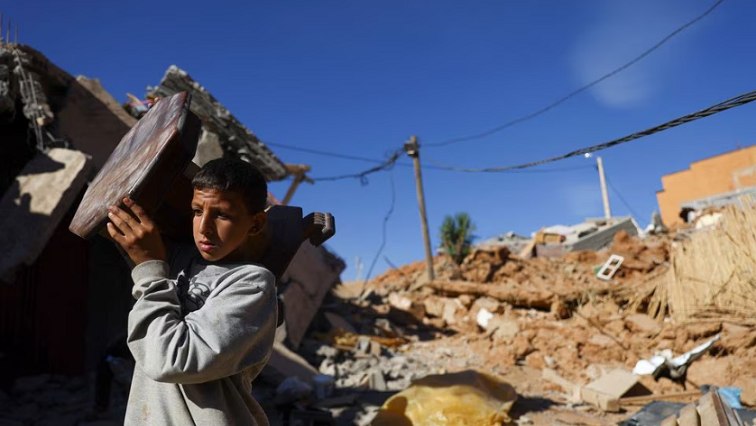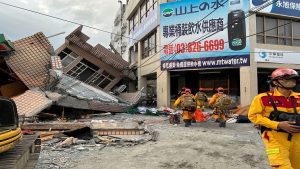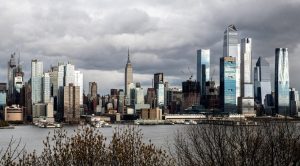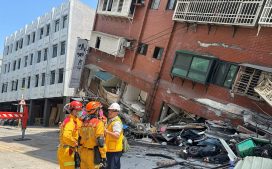Rescuers on Monday searched villages reduced to rubble for any survivors of Morocco’s deadliest earthquake in more than six decades, in a desperate race against time as the death toll rose to almost2,500 and the scale of destruction became clearer.
Search teams from Spain, Britain and Qatar were joiningefforts to find people buried under debris after a 6.8 magnitude quake struck late on Friday night in the High Atlas Mountains, with the epicentre 72 km (45 miles) southwest of Marrakech.
Many survivors spent a third night outside, their homes destroyed or rendered unsafe. The state news agency reported the death toll was now 2,497 with 2,476 people injured. Footage from the remote village of Imi N’Tala, filmed by Spanish rescuer Antonio Nogales of the aid group Bomberos Unidos Sin Fronteras (United Firefighters Without Borders), showed men and dogs clambering over steep slopes covered in rubble.
“The level of destruction is … absolute,” said Nogales, struggling to find the right word to describe what he was seeing. “Not a single house has stayed upright. We’re going to start our search with dogs and see whether we can find anyone alive.” In Imgdal, a village about 75 km south of Marrakech, women and children huddled early on Monday morning under makeshift tents set up along the road and next to damaged buildings.
Further south, a car stood crushed by boulders that had fallen from the cliff. In the village of Tafeghaghte, Hamid ben Henna described how his eight-year-old son died under wreckage after he had gone to fetch a knife from the kitchen to cut a melon as the family were having their evening meal.
The rest of the family survived.
MUD BRICK HOUSES CRUMBLED
With much of the quake zone in hard-to-reach areas, the authorities have not issued any estimates for the number of people missing. Roads blocked or obstructed by rocks have made it harder to access the worst-hit locations.
On a way to the town of Adassil, not far from the epicentre, rescue worker Ayman Koa it was trying to clear rockfalls that were blocking traffic. “There are worse roads further up that are still blocked and we’re trying to open them too,” he said, as vans loaded with aid squeezed along a narrow cleared track.
Many structures crumbled easily, including ubiquitous, traditional mud brick, stone and rough wood houses, one of the picturesque features that have made the High Atlas a magnet for tourists.
“It’s difficult to pull people out alive because most of the walls and ceilings turned to earthen rubble when they fell, burying whoever was inside without leaving air space,” said a military worker, asking not to be named because of army rules. The harm done to Morocco’s cultural heritage has been emerging gradually. Buildings in Marrakech old city, a UNESCO World Heritage Site, were damaged.
The quake also did major damage to the historically significant 12th-century Tinmel Mosque in a remote mountain area closer to the epicentre.
It was the North African country’s deadliest earthquake since 1960, when a tremor was estimated to have killed at least 12,000 people, and the most powerful since at least 1900,according to the U.S. Geological Survey.
LOCAL AND INTERNATIONAL AID
Survivors struggling to find shelter and supplies have described the government response as slow, though it appeared to be speeding up on Monday. In a televised statement on Sunday, government spokesperson Mustapha Baytas said every effort was being made on the ground. The army said it was reinforcing search-and-rescue teams, providing drinking water and distributing food, tents and blankets.
Neither King Mohammed VI nor Prime Minister Aziz Akhannouch have addressed the nation since the disaster. Morocco had accepted offers of aid from Spain and Britain, which both sent search-and-rescue specialists with sniffer dogs, from the United Arab Emirates, and from Qatar, which said on Sunday a search-and-rescue team was on its way.
The European Union said it was releasing an initial 1million euros ($1.07 million) to non-governmental aid organisations in Morocco.
State TV said the government had assessed needs and considered the importance of coordinating relief efforts before accepting help, and that it might accept relief offers from other countries later.
Both France and Germany played down the significance of Morocco not immediately taking them up on their offers of aid. Germany said on Monday it saw no indication that the decision was political, while France said on Sunday it stood ready to help whenever Morocco made a formal request and any controversy on the issue was “misplaced”.
Paris and Rabat have had a difficult relationship in recent years notably over the issue of Western Sahara, a disputed territory that Morocco wants France to recognise as Moroccan. Morocco has not had an ambassador in Paris since January.






